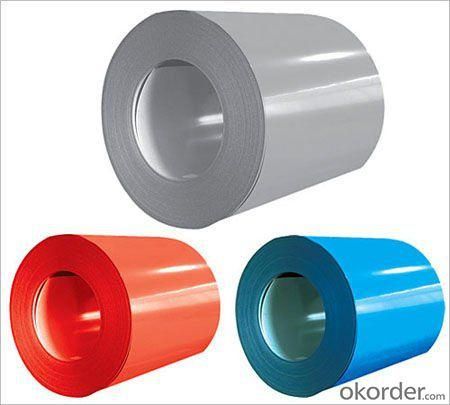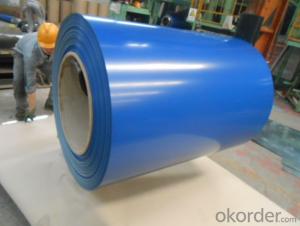PPGI,Pre-Painted Steel Coil with Prime Quality Blue Color
- Loading Port:
- Shanghai
- Payment Terms:
- TT OR LC
- Min Order Qty:
- 200 m.t.
- Supply Capability:
- 10000 m.t./month
OKorder Service Pledge
OKorder Financial Service
You Might Also Like
1. Pre-Painted Galvanized/Aluzinc Steel Coil Description:
With GI as base material, after pretreatment (degrease and chemical treatment ) and liquid dope with several layers of color, then after firing and cooling, finally the plate steel is called pre-painted galvanized (aluzinc) steel. Pre-painted galvanized steel is good capable of decoration, molding, corrosion resistance. It generally displays superior workability, durability and weather resistance.
2.Main Features of the Pre-Painted Galvanized/Aluzinc Steel Coil:
• Excellent process capability
• Smooth and flat surface
• Workability, durability
• Excellent heat resistance performance
• High strength
• Good formability
• Good visual effect
3.Pre-Painted Galvanized/Aluzinc Steel Coil Images

4.Pre-Painted Galvanized/Aluzinc Steel Coil Specification
Standard: AISI, ASTM, BS, DIN, GB, JIS
Grade: DX51D, DX52D
Thickness: 0.17-2.0mm
Brand Name: KMRLON
Model Number: coil
Type: Steel Coil
Technique: Cold Rolled
Surface Treatment: Coated
Application: Boiler Plate
Special Use: High-strength Steel Plate
Width: 20-1250mm
Length: customized
commoidty: pre-painted galvanized steel coil
Thickness: 0.13-4.0mm
width: 20-1250mm
zinc coating: 40-180g/m2
printing thickness: top side: 20+/-5 microns, back side: 5-7 microns
color: all RAL color
surface treatment: color coated
coil weight: 4-7 tons
coil ID: 508/610mm
packaging: standard seaworthy packing
5.FAQ of Pre-Painted Galvanized/Aluzinc Steel Coil
1. What’s the application of this product?
Roof, roof structure, surface sheet of balcony, frame of window, etc.
2. What’s the brand of the paint?
We use the best brand of all of the word—AKZO.
3. How to guarantee the quality of the products?
We have established the international advanced quality management system,every link from raw material to final product we have strict quality test;We resolutely put an end to unqualified products flowing into the market. At the same time, we will provide necessary follow-up service assurance.
4. How long can we receive the product after purchase?
Usually within thirty working days after receiving buyer’s advance payment or LC. We will arrange the factory manufacturing as soon as possible. The cargo readiness usually takes 15-25 days, but the shipment will depend on the vessel situation.
- Q:Is there alloys in low carbon steel or non
- Steel is an alloy. An alloy is a mixture of metals melted together, a solid solution. There are many recipes for steel depending on what the use is. Steel is an alloy of iron and another metal .Low carbon steel has less than 0.3% carbon, carbon steel is 0.3 to 0.6% carbon Low carbon steels generally contain less than 0.25% carbon and cannot be strengthened by heat-treating (strengthening can only be accomplished through cold working). The low carbon material is relatively soft and weak, but has outstanding ductility and toughness. In addition, it is machineable, weld-able, and is relatively inexpensive to produce. Carbon steel, also called plain carbon steel, is steel where the main alloying constituent is carbon. The American Iron and Steel Institute (AISI) defines carbon steel as: Steel is considered to be carbon steel when no minimum content is specified or required for chromium, cobalt, columbium, molybdenum, nickel, titanium, tungsten, vanadium or zirconium, or any other element to be added to obtain a desired alloying effect; when the specified minimum for copper does not exceed 0.40 percent; or when the maximum content specified for any of the following elements does not exceed the percentages noted: manganese 1.65, silicon 0.60, copper 0.60.
- Q:So what's harder gold or steel
- steel. it's used to support skyscrapers lol. gold can be molded easily into jewelry. although both gold and steel are both malleable, steel is harder to shape.
- Q:What are the typical lead times for ordering steel coils?
- Lead times for ordering steel coils can vary based on factors such as coil type, size, supplier capacity, and market conditions. On average, lead times range from a few weeks to several months. When it comes to standard-sized steel coils readily available in the market, lead times are generally shorter. This is because suppliers keep stock of these commonly used sizes to meet immediate customer demands. However, transportation and logistics can still impact lead times. For custom-made or non-standard steel coils, lead times tend to be longer due to additional processes like cutting, shaping, or coating. Production time can range from a few months to six months or more, depending on the complexity of specifications and supplier capabilities. External factors like market demand and raw material availability can also affect lead times. During high demand or supply chain disruptions, suppliers may need to adjust production schedules, leading to extended lead times. To determine accurate lead times, it is recommended to contact specific suppliers or manufacturers. They can provide the most up-to-date information based on your requirements and current market conditions.
- Q:Can steel coils be stored outdoors?
- Steel coils can be stored outdoors, but it is important to protect them from moisture and other environmental elements to prevent rust and damage.
- Q:What are the different methods of tension leveling for steel coils?
- There are various techniques available for tension leveling steel coils, each with its own benefits and applications. 1. Roller leveling: By passing the steel coil through a series of rollers under high tension, strategically positioned to exert pressure on the coil, this method effectively stretches and elongates the coil. It is commonly used for thinner gauge coils and effectively eliminates defects such as coil set, crossbow, and edge wave. 2. Stretch leveling: This technique involves subjecting the steel coil to a combination of tension and elongation. The coil is held by clamps at both ends and then stretched using hydraulic or mechanical devices. This process helps remove residual stresses, flatten the coil, and enhance shape control. Stretch leveling is particularly suitable for thicker gauge coils, effectively eliminating wavy edges and center buckle. 3. Temper rolling: By passing the steel coil through a series of temper rolls that apply pressure on the surface, this method is primarily used to improve the surface finish and enhance the mechanical properties of the steel. It also helps reduce coil set and improve flatness. 4. Skin pass rolling: After the primary leveling process, the steel coil is passed through a series of rolls that apply light pressure on the surface. This technique is typically performed to further improve surface finish, enhance flatness, and reduce surface defects such as scratches or marks. 5. Stretcher leveling: This technique involves clamping the steel coil at both ends and applying tension to stretch it. The stretched coil is then held in this position for a specific duration to allow for stress relief and shape correction. It is commonly used for thicker gauge coils and effectively removes defects like coil set, crossbow, and center buckle. Each tension leveling method offers distinct advantages and is suitable for different types of steel coils and specific requirements. The choice of method depends on factors such as coil thickness, desired flatness, surface finish, and the specific defects that need to be corrected.
- Q:What are the advantages of using steel coils in the manufacturing industry?
- There are several advantages of using steel coils in the manufacturing industry. Firstly, steel coils provide excellent strength and durability, making them ideal for applications that require high load-bearing capacity. Secondly, steel coils are highly resistant to corrosion, making them suitable for outdoor or harsh environments. Additionally, steel coils offer consistent and uniform properties, ensuring reliable and precise manufacturing processes. Moreover, steel coils can be easily formed and shaped, allowing for versatile use in various industries. Lastly, steel coils are recyclable, making them an environmentally friendly choice.
- Q:Is it possible to make a homemade blacksmith forge from a washing machine drum made of stainless steel?
- If you build it properly, it will work. That drum is a little small though. I once made a forge from a wheel barrow with a brake drum fire pot and used it for a couple of years.
- Q:What are the typical tolerances for steel coils?
- The typical tolerances for steel coils depend on various factors such as the specific grade of steel, the manufacturing process, and the intended application. However, some common tolerances for steel coils include thickness tolerances of +/- 0.005 to 0.010 inches, width tolerances of +/- 0.020 to 0.050 inches, and length tolerances of +/- 0.125 to 0.250 inches. These tolerances ensure that the steel coils meet the required specifications and can be used efficiently in different industries such as automotive, construction, and manufacturing.
- Q:What are the main factors to consider when selecting a steel coil supplier?
- When selecting a steel coil supplier, some of the main factors to consider include the supplier's reputation and experience in the industry, the quality and consistency of their products, their ability to meet your specific requirements and timelines, their customer service and support, as well as their pricing and overall value proposition.
- Q:rust is not a issue. i was looking a D2 steel but heard story's of it chipping and breaking
- The very best is Damascus steel or the composite samari blade. Talk to the American Bladesmith Society if you are interested in forging your own or buying a forged blank and making the knife yourself. D2 and other similar tool steels are generally not a good choice because they can not obtain very high hardness but they should be tough (resistant to cracking) if they were heat treated properly. There are more ways to heat treat wrong than there are to heat treat right. Although you say rust is not an issue, 440 stainless steel is commonly used for commercial knives, it does not rust, holds a good edge, and is pretty tough.
1. Manufacturer Overview |
|
|---|---|
| Location | |
| Year Established | |
| Annual Output Value | |
| Main Markets | |
| Company Certifications | |
2. Manufacturer Certificates |
|
|---|---|
| a) Certification Name | |
| Range | |
| Reference | |
| Validity Period | |
3. Manufacturer Capability |
|
|---|---|
| a)Trade Capacity | |
| Nearest Port | |
| Export Percentage | |
| No.of Employees in Trade Department | |
| Language Spoken: | |
| b)Factory Information | |
| Factory Size: | |
| No. of Production Lines | |
| Contract Manufacturing | |
| Product Price Range | |
Send your message to us
PPGI,Pre-Painted Steel Coil with Prime Quality Blue Color
- Loading Port:
- Shanghai
- Payment Terms:
- TT OR LC
- Min Order Qty:
- 200 m.t.
- Supply Capability:
- 10000 m.t./month
OKorder Service Pledge
OKorder Financial Service
Similar products
New products
Hot products
Related keywords





























